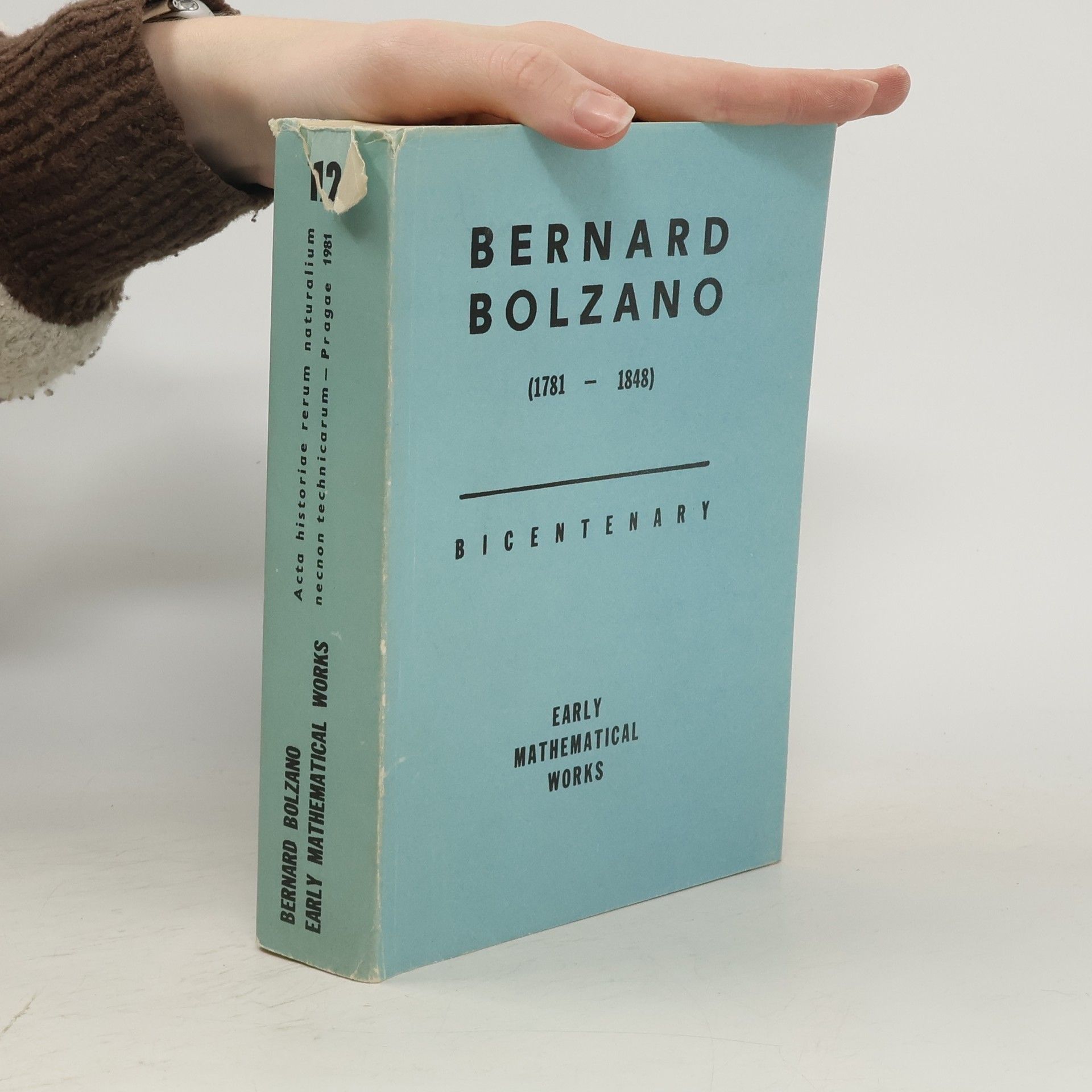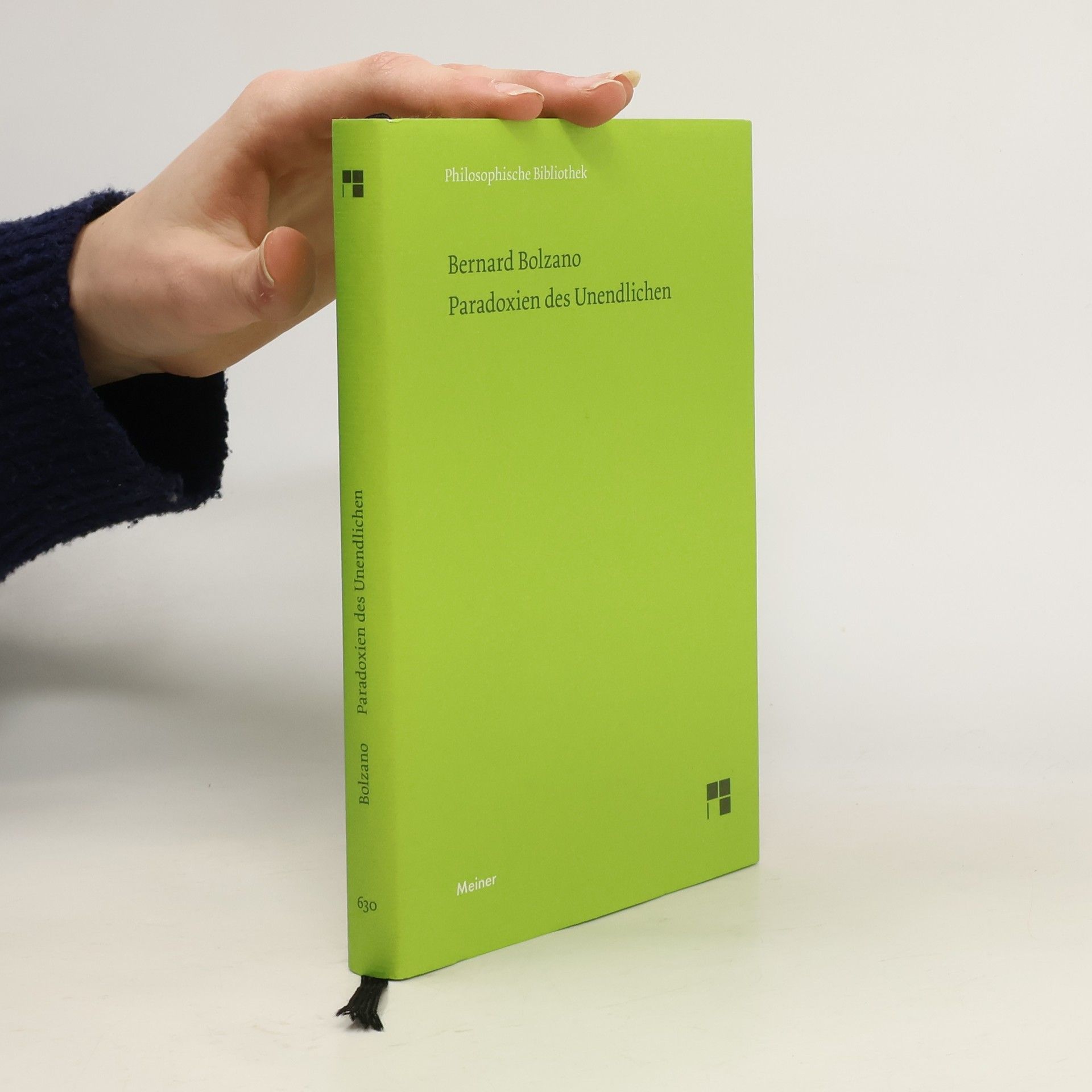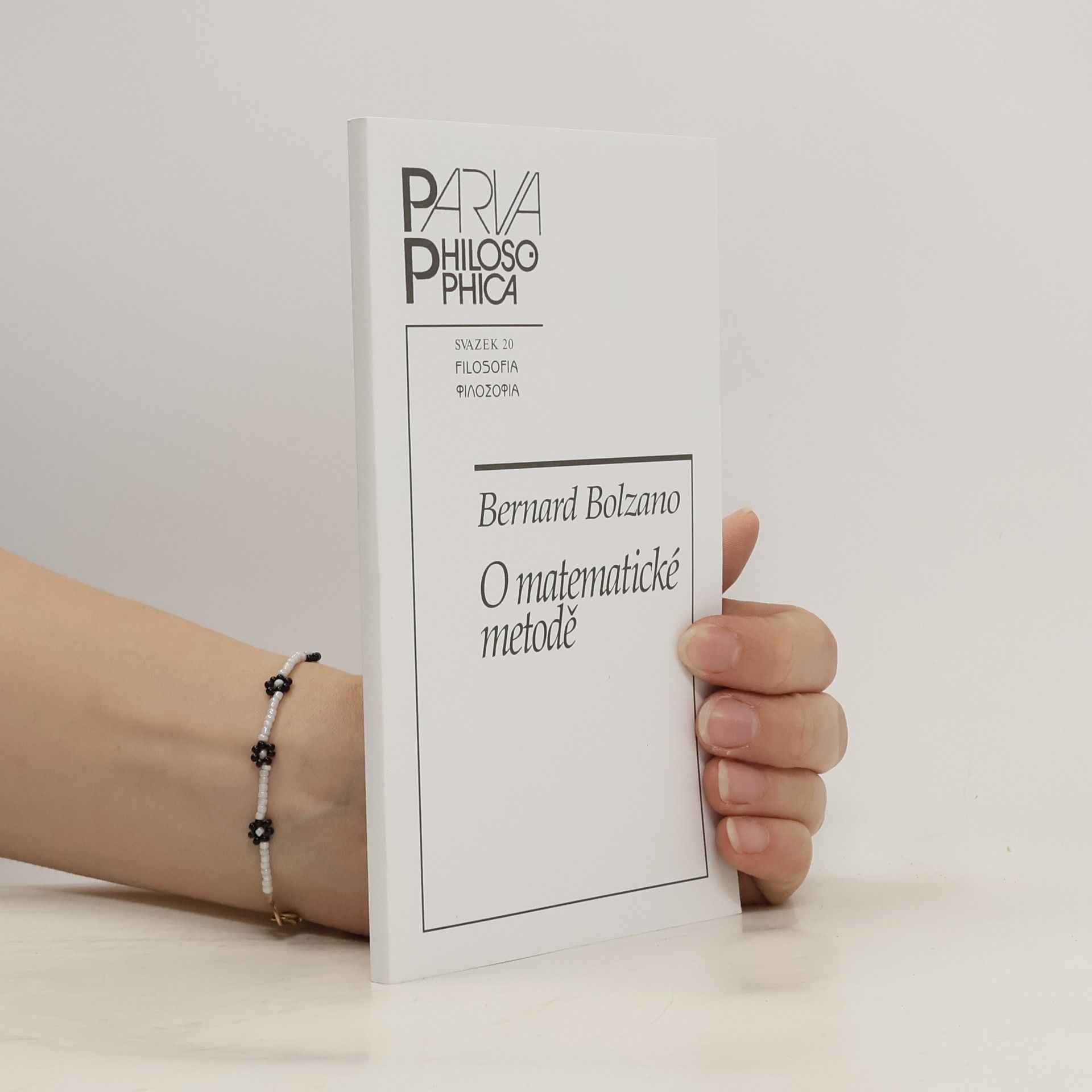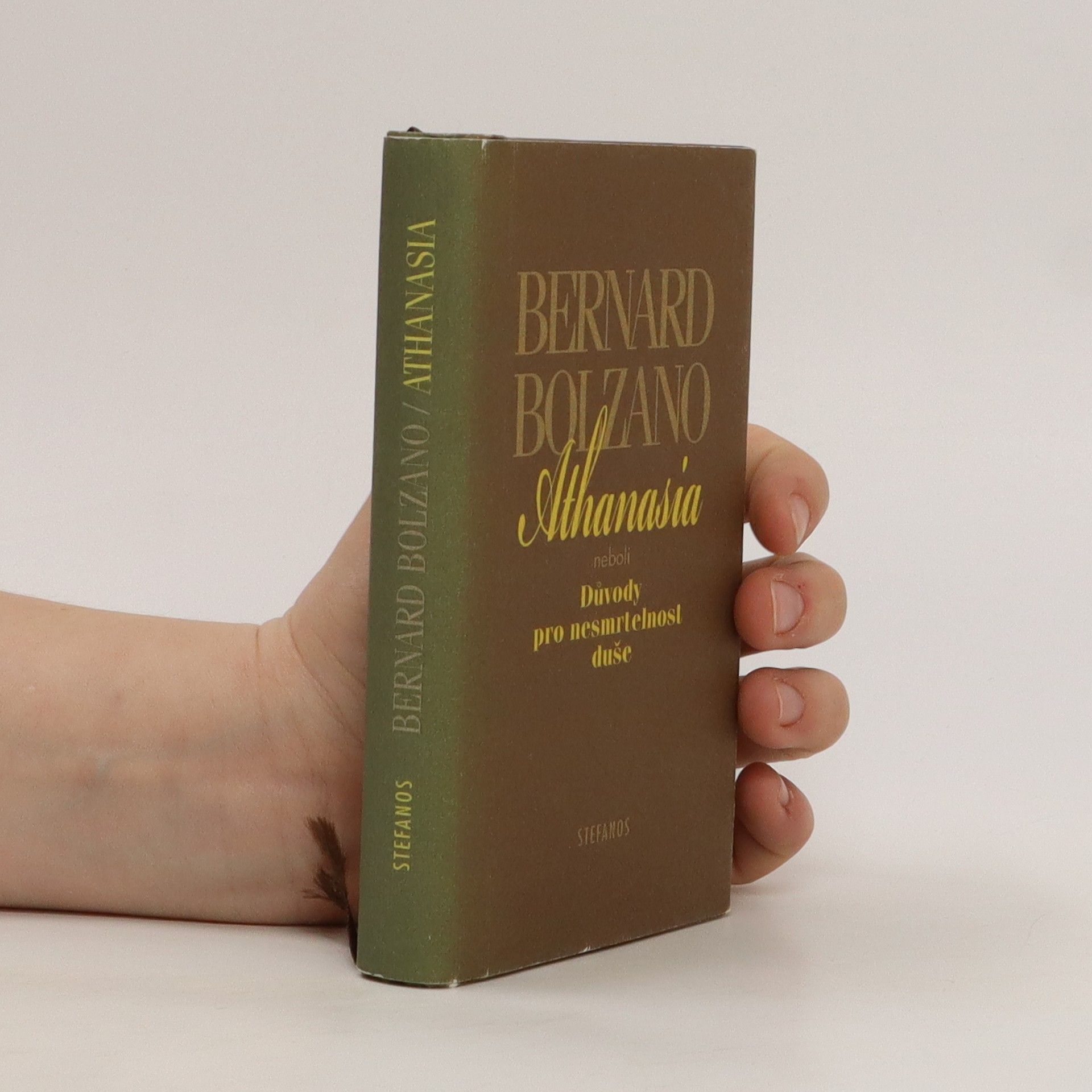Der Zusatzband zu Bernard Bolzanos "Wissenschaftslehre" umfasst ein Sachregister und Nachweise. Das Sachregister bietet eine systematische Übersicht der behandelten Themen und erleichtert die Navigation. Die Nachweise listen die Quellen auf, die Bolzano in seinem Hauptwerk verwendet hat. Der Band dient lediglich als Ergänzung.
Bernard Bolzano Book order (chronological)







Essays on Beauty and the Arts
- 176 pages
- 7 hours of reading
Bernard Bolzano's (1781-1848) writings in aesthetics are clear, concise, and explicit about method. Provocative and revisionary, they champion broad views of beauty, the arts, and their social function. Dominic McIver Lopes's introductory materials place Bolzano's essays in context, give them a new interpretation, and map out how to teach them, in full or in part, in a variety of courses.
Der fünfte und letzte Teilband von Bolzanos Briefen an Fesl umfasst 82 Schreiben aus den Jahren 1846 bis 1848, in denen er trotz seiner schlechten Gesundheit neue Projekte angeht, von denen die Schriften über soziale Fragen – nicht zuletzt ›Über die Wohlthätigkeit‹ (1847) – noch zu seinen Lebzeiten erscheinen, andere hingegen erst postum, darunter das ›Kurzgefaßte Lehrbuch der katholisch-christlichen Religion‹ (1849), der Aufsatz ›Ueber die Eintheilung der schönen Künste‹ (1849), ›Drei philosophische Abhandlungen […]‹ (1851) und die ›Paradoxien des Unendlichen‹ (1851). In seinem letzten Lebensjahr nimmt Bolzano zudem klar Stellung zu den als »bürgerliche Revolution« bekannten politischen Vorgängen.
Athanasia; oder, Gründe für die Unsterblichkeit der Seele; ein Buch für jeden Gebildeten, der hierüber zur Beruhigung gelangen will (472 pages)
Bernard Bolzano Gesamtausgabe / Reihe II: Nachlaß. A. Nachgelassene Schriften. Band 13
- 278 pages
- 10 hours of reading
Der Band präsentiert erstmals Bolzanos ästhetische Abhandlungen "Arten des Schönen" und "Verschiedene in die Ästhetik gehörige Begriffe" aus dem Prager Nachlass sowie eine kritische Neuausgabe von "Über die Eintheilung der schönen Künste". Neben detaillierten Beschreibungen weiterer Handschriften zu ästhetischen Themen werden fünf dieser Texte kritisch ediert, die sich mit Poetik und einer Kritik an Goethes "Wilhelm Meister" befassen. Ein Anhang bietet eine chronologische Übersicht über Bolzanos ästhetische Arbeiten und ein Verzeichnis relevanter Literatur, das eine umfassende Würdigung seiner Ästhetik ermöglicht.
Bernard Bolzano Gesamtausgabe / Reihe I: Schriften. Band 1: Mathematische Schriften 1804-1810
- 187 pages
- 7 hours of reading
Die 'Betrachtungen über einige Gegenstände der Elementargeometrie' stellt den Auftakt zu Bolzanos umfassendem Programm zur Neugestaltung der Geometrie und Mathematik dar. Er lehnt traditionelle Konzepte wie Bewegung und Ebene ab und präsentiert Beweise für grundlegende Lehrsätze über Dreiecke und Parallellinien, die auf seiner neuartigen Theorie der geraden Linie basieren. Zudem behandelt er in den 'Beyträgen zu einer begründeteren Darstellung der Mathematik' die Natur und Klassifikation der Mathematik, wobei er eine abstrakte Definition als Wissenschaft formuliert, die sich mit allgemeinen Gesetzen beschäftigt.
Philosophische Bibliothek - 630: Paradoxien des Unendlichen
- 228 pages
- 8 hours of reading
Die „Paradoxien des Unendlichen“ sind ein Klassiker der Philosophie der Mathematik und bieten eine Einführung in das Denken von Bernard Bolzano, dem „Urgroßvater“ der analytischen Philosophie. Das Unendliche, ein faszinierendes Thema der philosophischen Reflexion, wurde nach der Grundlegung der Analysis von Leibniz und Newton zunächst als problematisch angesehen. Bolzano zeigt in diesem bedeutenden Text, dass es bei differenzierter Argumentation und klaren Definitionen keine echten Widersprüche gibt und die „Paradoxien des Unendlichen“ auflösbar sind. Er analysiert die Unendlichkeitsbegriffe der Mathematik und der idealistisch geprägten Philosophie seiner Zeit und entwickelt schrittweise die analytischen Grundlagen einer konsistenten Theorie des Unendlichen. Bereits Jahrzehnte vor Georg Cantor gelingt es Bolzano, das Unendliche für die Philosophie der Mathematik zu rehabilitieren. Seine logische Klarheit und philosophische Durchdachtheit sind bis heute beispielhaft. Die „Paradoxien des Unendlichen“ wurden erstmals 1851 aus dem Nachlass veröffentlicht, und die Neuausgabe basiert auf dem Manuskript der Erstausgabe.
Překlad části obšírného úvodu matematického spisu Grossenlehre, v níž Bolzano přehledně vymezuje základní pojmy své koncepce logiky, jak ji dříve rozvinul především ve svém logickém spise Wissenschaftslehre. Současně zde Bolzano podává návod metodického postupu, jakým má být vedena výuka a výklad vědy, především matematiky, a přichází s požadavkem důsledně exaktní výstavby celého výkladu zahrnující i definice základních pojmů a důkazy výchozích tvrzení. Přeložila a úvodní studii napsala Marta Vlasáková.
Spis kněze a filosofa Bernarda Bolzana (1781–1848) pochází z roku 1827 a hledá odpověď na onu zásádní otázku, kterou si dle autora klade každý moudrý člověk: Bude náš život pokračovat i po smrti, a v jaké podobě? Osvícenecký objektivista a realista je přesvědčen, že duše je vskutku nesmrtelná, a dílo samotné je pokusem o co možná nejpřesvědčivější představení důvodů k této víře. Bůh, člověk, jeho lidská duše a také příroda jsou pro Bolzana nepochybné skutečnosti. Konzolační spis má kořeny ve slavném Boethiově díle Útěcha z filosofie a rovněž navazuje na úvahy o nesmrtelnosti v Platónově dialogu Faidón.
Bernard Bolzano Gesamtausgabe / Reihe I: Schriften. Band 8,4: Lehrbuch der Religionswissenschaft. Dr
- 297 pages
- 11 hours of reading
Bernard Bolzano behandelt in seinen Vorlesungen grundlegende Konzepte der Religionsphilosophie, die erstmals in einer kritischen Edition veröffentlicht wurden. Die Arbeit gliedert sich in drei Teile: Zunächst erläutert Bolzano zentrale Begriffe und die Theorien der natürlichen und rationalen Religion. Im zweiten Teil analysiert er die Wunder, die den katholischen Glauben bestätigen. Der dritte Teil widmet sich den spezifischen Glaubensartikeln und der Moral der "Altkatholischen Dogmatik". Diese neue Edition enthält Bolzanos Korrekturen und Varianten, die seine ursprünglichen Gedanken klarer darstellen.

